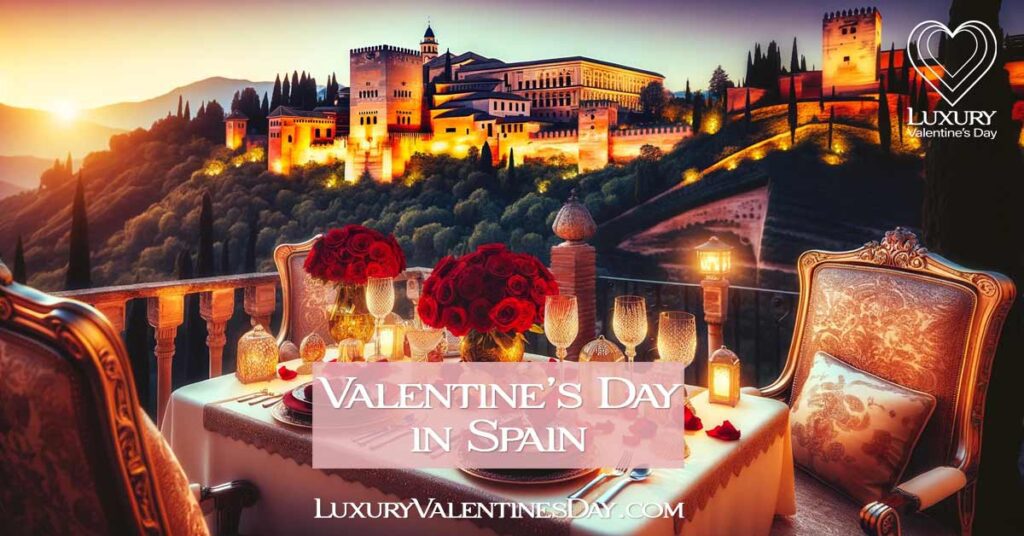
Discover the Passion: Valentine’s Day in Spain
Spain, with its vibrant streets and moonlit beaches, offers a canvas where love is not just celebrated but deeply savoured. “El Día de San Valentín” here is an affair that goes beyond the ordinary, promising memories that last a lifetime. As an experienced travel writer who has wandered through the romantic alleys of this passionate land, I invite you to uncover the secrets that make Valentine’s Day in Spain truly unforgettable. From hidden traditions to luxurious destinations, this guide is your key to experiencing a celebration of love like no other. So, let’s embark on this journey together, exploring the nuances that make Spain’s Valentine’s Day a treasure trove of experiences.
Valentine’s (El Día de San Valentín) Dates: Marking Love Through the Years
Valentine’s Day or El Día de San Valentín, a day dedicated to celebrating love and affection, holds a special place in the hearts of many. Knowing the exact dates for upcoming Spanish Valentine’s Days can help in planning those perfect romantic gestures, trips, or surprises. Here’s a handy table to keep track of Valentine’s Day for the next several years, making it easier for you to plan ahead for those special moments.
| Year | Date | Day |
|---|---|---|
| 2024 | February 14 | Wednesday |
| 2025 | February 14 | Friday |
| 2026 | February 14 | Saturday |
| 2027 | February 14 | Sunday |
| 2028 | February 14 | Monday |
| 2029 | February 14 | Wednesday |
| 2030 | February 14 | Thursday |
An Introduction To Spain
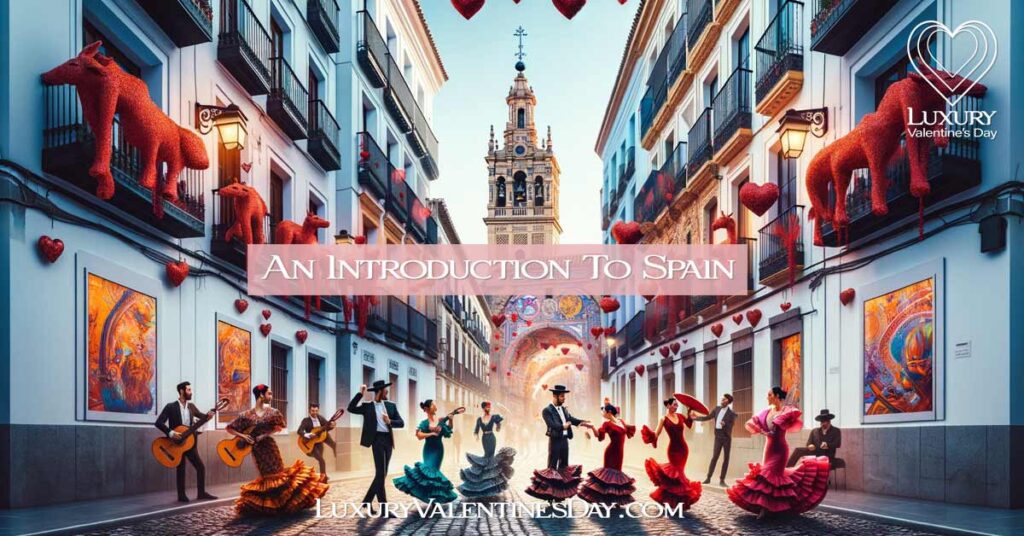
Spain is a country that pulsates with life, where every street corner tells a story of passion, history, and celebration. Known for its rich cultural tapestry, Spain seamlessly weaves together the old and the new, creating a vibrant mosaic that is both timeless and contemporary. The country’s approach to love and celebrations is deeply rooted in its history, echoing the sentiments of its people who live life to the fullest.
From the flamenco dancers of Andalusia to the historic palaces of Madrid, Spain offers a backdrop that transforms every celebration into an unforgettable experience. The lively festivals, the intimate siestas, and the warm, welcoming people make Spain a haven for lovers and dreamers alike. Here, “El Día de San Valentín” is not just a day on the calendar but a heartfelt celebration that resonates through the lively streets, cozy cafes, and breathtaking landscapes.
In Spain, love is not just spoken; it is lived. The country’s unique approach to celebrating “El Día de San Valentín” is a testament to its rich traditions and the spirited nature of its people. So, let’s delve into the heart of Spain to explore how this nation turns a global celebration of love into something uniquely its own.
How to Say “Happy Valentine’s Day” in Spanish

Navigating the language of love in Spain can be a delightful experience, as the words seem to carry a melody and warmth that resonate with the country’s passionate spirit. Saying “Happy Valentine’s Day” in Spanish is a beautiful way to connect with the locals and immerse yourself in the celebration.
“Feliz Día de San Valentín” is the phrase that lights up faces and hearts on this special day. It translates to “Happy Valentine’s Day” and is a simple yet heartfelt way to convey your wishes.
But why stop there? Spanish, being a language rich in expressions of affection, offers you more phrases to sprinkle your conversations with that touch of romance:
- Amor: This means “love” and is a word that you’ll hear often.
- Te quiero: A sweet and sincere way to say “I love you.”
- Mi amor: This translates to “my love,” a term of endearment that is commonly used.
- Eres mi corazón: This phrase means “you are my heart,” expressing deep love and connection.
- Te adoro: This means “I adore you,” adding a layer of deep admiration to your confessions of love.
These phrases are not just words; they are a melody that dances in the air, especially on “El Día de San Valentín.” So, when in Spain, let your heart speak in Spanish and watch as the magic of love unfolds around you.
What Day is El Día de San Valentín and Its Historical Background
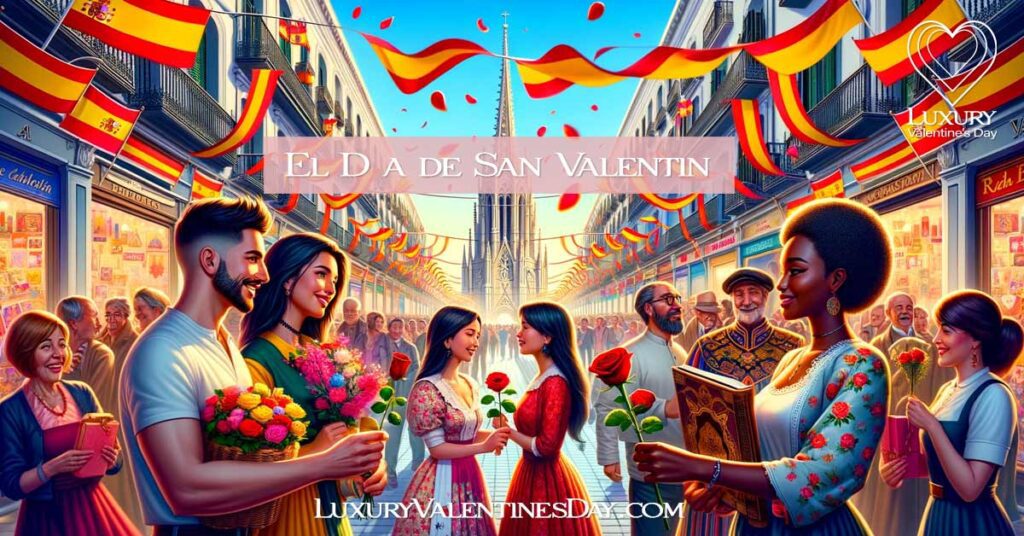
In Spain, “El Día de San Valentín,” or Valentine’s Day, is celebrated with fervor and joy on February 14th, aligning with the global tradition of dedicating this day to expressions of love and affection. But what makes this day so special, and how did it find its place in the hearts of the Spanish people?
The historical roots of Valentine’s Day in Spain are intertwined with tales of romance and the enduring human desire to celebrate love. While the tradition of celebrating “El Día de San Valentín” in Spain is relatively recent compared to some other countries, it has been embraced with open arms and has quickly become a cherished occasion.
The day is named after Saint Valentine, a Christian martyr who is believed to have secretly wedded couples in love, defying the decree of the Roman Emperor Claudius II. This act of defiance and commitment to love resonates with the passionate spirit of Spain, making “El Día de San Valentín” a fitting celebration.
In the 20th century, as global influences made their way into Spain, “El Día de San Valentín” began to gain popularity. The Spanish people, known for their zest for life and love, adopted this day as a time to express their feelings to their loved ones. It became an opportunity to pause and celebrate love amidst the hustle and bustle of everyday life.
Today, the historical background of “El Día de San Valentín” adds a layer of depth to the celebrations. The tales of Saint Valentine’s courage and the universal desire to celebrate love have found a harmonious blend in Spain. This day is not just a date on the calendar but a reflection of Spain’s rich history and its people’s passionate approach to life and love.
Is Valentine’s Day a Holiday in Spain?
While “El Día de San Valentín,” or Valentine’s Day, is a widely celebrated occasion in Spain, it is not recognized as a public holiday, like most countries in Europe. This means that businesses, schools, and government offices remain open as usual, and the day proceeds like any other weekday in terms of work and official commitments.
However, this doesn’t diminish the enthusiasm and fervour with which the Spanish people celebrate this day of love. Even though it’s not a day off from work or school, the spirit of “El Día de San Valentín” is very much alive in the hearts of the people. Shops and streets are adorned with decorations, and there is a palpable sense of romance in the air.
Restaurants often offer special menus for couples, and shops may have an array of gifts and cards tailored for the occasion. Couples find ways to make the day special, whether it’s by sharing a meal, exchanging gifts, or simply spending quality time together. Friends may also exchange small tokens of affection, making the day a celebration of love in all its forms.
In essence, while it may not be a public holiday in Spain, the spirit of celebration and the emphasis on love and relationships elevate the day to a level of significance that is cherished by many. The lack of official holiday status doesn’t deter the Spanish people from embracing the day and making it their own, infusing it with warmth, passion, and joy.
More than one “Day of Love” in Spain
A country known for its passionate spirit and zest for life, one day is simply not enough to celebrate the myriad expressions of love. While “El Día de San Valentín” on February 14th is widely celebrated, Spain has additional days dedicated to love that are deeply rooted in regional traditions and cultural heritage.
One such celebration takes place in Catalonia on April 23rd, known as Sant Jordi or Saint George’s Day. This day is akin to Valentine’s Day and is celebrated with much enthusiasm, especially in Barcelona. Sant Jordi is not just about romantic love but also celebrates literature and culture. Traditionally, couples exchange gifts: a man gives a rose to a woman, and in return, a woman gives a book to a man. The streets of Barcelona come alive with stalls selling roses and books, and the city is adorned with the colors of the Catalan flag.
Another unique celebration is San Dionisio, celebrated in Valencia on October 9th. This day is also known as the “Day of the Valencian Community.” Similar to Sant Jordi, couples exchange gifts, but in this case, it’s usually a handkerchief filled with marzipan sweets. The sweets, known as “piuleta” and “tronador,” are a delightful treat and an integral part of the celebration.
These regional celebrations add a unique flavour to the concept of love in Spain. They are deeply intertwined with local customs, traditions, and even gastronomy. Each celebration, while distinct in its practices, echoes the same sentiment of love and affection.
By having more than one “Day of Love,” Spain showcases its rich cultural diversity and the importance it places on celebrating love in all its forms. These celebrations are a testament to Spain’s ability to embrace and cherish various traditions, making each one a unique and memorable experience.
You Can Also Celebrate Not Being in Love
Valentine’s Day, or “El Día de San Valentín,” extends beyond romantic connections and offers an opportunity to celebrate the joys of being single and the bonds of friendship. Embracing the spirit of inclusivity, individuals who are not in romantic relationships find unique and fulfilling ways to revel in the day.
Treating oneself to a day of self-care, indulging in favourite activities, or spending quality time with friends are popular ways to mark the occasion. Whether it’s a spa day, a delightful solo meal, or a movie marathon, the focus is on self-love and enjoyment.
Groups of friends often come together to celebrate their camaraderie. Exchanging small tokens of appreciation or sharing a meal, the day transforms into a celebration of platonic love and strong bonds.
“Anti-Valentine’s Day” parties and events also find a place in the festivities. These gatherings, often marked by humor and a sense of community, provide a space for individuals to connect and share experiences.
By diversifying the ways in which this day can be celebrated, the emphasis shifts from solely romantic love to include all forms of affection and connection, ensuring that everyone feels included and celebrated.
LGBTQ+ Friendly
Spain stands out as one of the most LGBTQ+ friendly countries in the world, and this inclusive spirit is reflected in the celebrations of “El Día de San Valentín.” The day is not just a celebration of love between heterosexual couples but is embraced by people across the spectrum of sexual orientations and gender identities.
In cities like Madrid, Barcelona, and Valencia, Valentine’s Day is an opportunity for LGBTQ+ individuals and couples to express their love and celebrate their relationships openly. Establishments across the country, from restaurants to boutiques, cater to all couples, ensuring that the celebrations are inclusive and welcoming.
Pride in love is a sentiment that resonates deeply in Spain. Various events, parties, and gatherings are organized specifically to celebrate the diversity of love. LGBTQ+ friendly venues may host special themed nights or offer deals that cater to everyone, regardless of their sexual orientation.
In recent years, there has been a growing trend of LGBTQ+ couples sharing their Valentine’s Day celebrations on social media, further normalizing and bringing visibility to diverse expressions of love. This openness and acceptance create an atmosphere where everyone feels free to celebrate “El Día de San Valentín” in their own unique way.
Spain’s progressive stance on LGBTQ+ rights and its inclusive approach to celebrations like Valentine’s Day make it a place where love in all its forms is acknowledged and celebrated. The sense of community, acceptance, and the joy of being able to love openly are what make “El Día de San Valentín” truly special and inclusive in Spain.
You can learn more about LGBTQ+ in Spain here.
Valentine’s Day Food in Spain
The celebration of “El Día de San Valentín” is incomplete without indulging in the country’s culinary delights. Spanish cuisine, known for its vibrant flavours and rich diversity, adds a special touch to the day, making it a feast for the senses.
A classic start to a romantic meal could be a selection of tapas, small dishes that are perfect for sharing. From patatas bravas (fried potatoes with a spicy tomato sauce) to gambas al ajillo (garlic prawns), these bite-sized delights set the tone for a cozy and intimate meal.
Seafood holds a special place in Spanish cuisine and is often featured prominently in Valentine’s Day menus. Dishes like paella de mariscos (seafood paella) or pulpo a la gallega (Galician-style octopus) are popular choices that add a touch of elegance to the meal.
For the main course, couples might opt for something hearty and traditional like cochinillo asado (roast suckling pig) or a delicate merluza a la koskera (hake in a white asparagus and clam sauce). These dishes, rich in flavors and crafted with love, make the dining experience truly memorable.
Desserts in Spain are a celebration of sweetness and are an essential part of Valentine’s Day. Churros con chocolate, a beloved classic, are often enjoyed by couples. Additionally, pastries like tarta de Santiago (almond cake) or flan (caramel custard) add a sweet ending to the meal.
To complement the food, a bottle of fine Spanish wine or cava, a sparkling wine from Catalonia, is often chosen. The clinking of glasses and a toast to love add a sparkle to the celebrations.
Spanish food is not just about flavors; it’s an experience, a way to connect and create memories. The emphasis on fresh ingredients, traditional recipes, and the joy of sharing a meal make Valentine’s Day in Spain a gastronomic journey that complements the romance of the day.
How is El Día de San Valentín Celebrated?
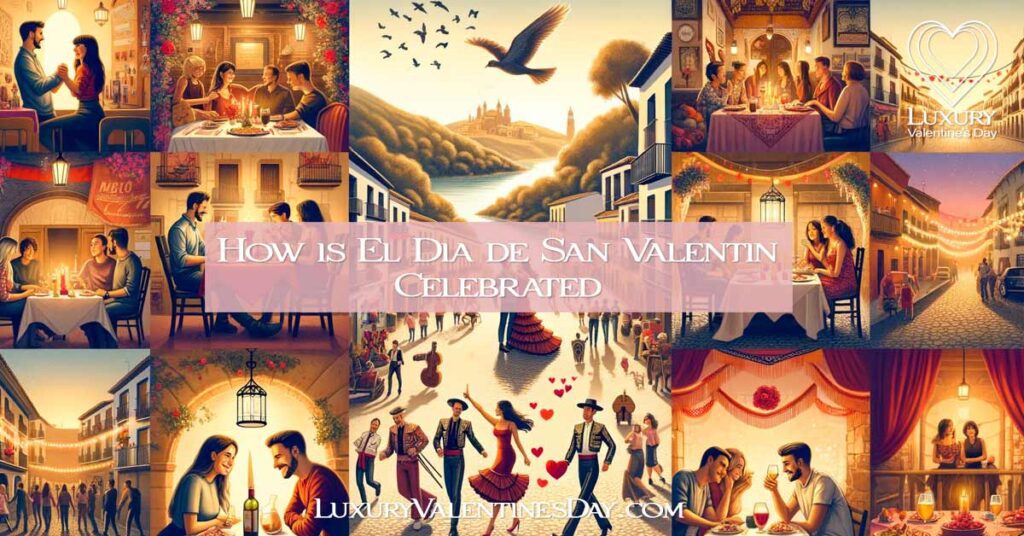
The celebration of “El Día de San Valentín” in Spain is a vibrant affair that beautifully encapsulates the country’s passionate and warm spirit. While the essence of the day aligns with global traditions of expressing love and affection, Spain adds its unique flair to the festivities.
1. Gift-Giving
Exchanging gifts is a common practice, with couples giving each other tokens of affection such as flowers, chocolates, and jewelry. Personalized gifts, like a custom piece of jewelry or a handwritten letter, hold a special charm and are cherished.
2. Romantic Dinners
Dining out is a significant part of the celebration. Restaurants often curate special Valentine’s Day menus, offering a selection of exquisite dishes. Candlelit tables, soft music, and a romantic ambiance set the stage for an intimate meal.
3. Public Displays of Affection
Strolling hand-in-hand along the streets or sharing a kiss at a picturesque spot is a common sight. Public spaces, like parks and squares, become venues for couples to express their love openly.
4. Cultural Experiences
Couples may choose to spend the day indulging in cultural experiences, such as attending a flamenco show, visiting an art gallery, or enjoying a classic Spanish movie.
5. Getaways
For those seeking a more extended celebration, romantic getaways to quaint villages or luxurious beach resorts are popular. Spain’s diverse landscapes offer a plethora of options, from the serene beaches of Costa Brava to the historic charm of cities like Seville.
6. Friendship Celebrations
Valentine’s Day in Spain is not limited to romantic couples. Friends often celebrate together, exchanging gifts and spending time enjoying each other’s company.
7. Inclusive Celebrations
Spain’s LGBTQ+ community also partakes in the celebrations with enthusiasm. Special events and parties are organized, making the day inclusive and representative of all forms of love.
8. Family Love
Families, too, use this day to express their affection for each other, with small gifts or shared meals.
9. Anti-Valentine’s Day Events
For those who prefer to celebrate singlehood or take a lighter approach, anti-Valentine’s Day parties and gatherings offer a fun alternative.
In essence, “El Día de San Valentín” in Spain is a multifaceted celebration that goes beyond the conventional. It is a day that embraces love in all its forms, ensuring that everyone, regardless of their relationship status, can partake in the joy and warmth that this day brings.
Common Gifts and Their Meanings in Spain
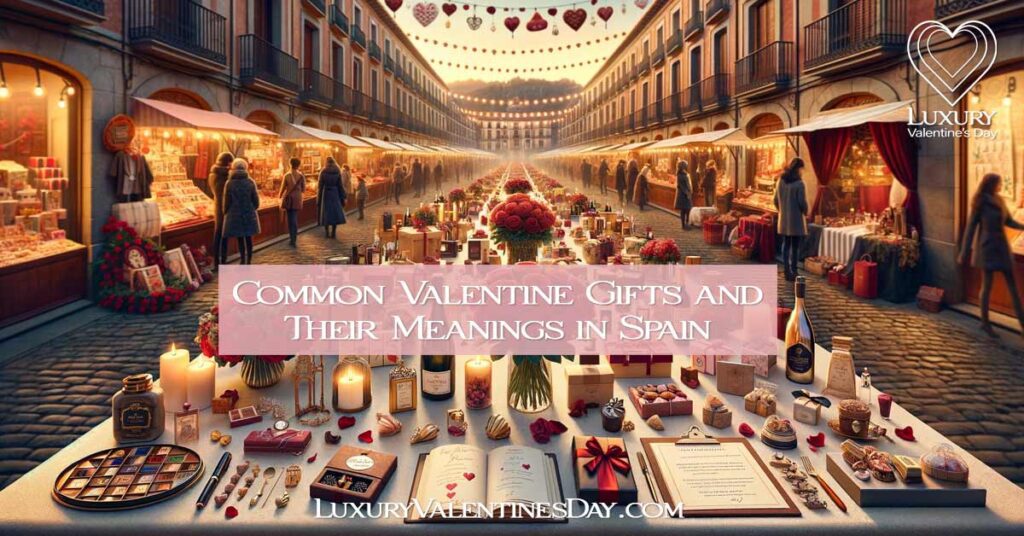
| Gift | Meaning | Why It’s Popular |
|---|---|---|
| Roses | Symbolizing love and passion, roses are a classic expression of romantic feelings. | A bouquet of red roses is a timeless gesture and is widely appreciated for its elegance and sentiment. |
| Chocolates | Representing sweetness and indulgence, chocolates are a delightful treat. | Gifting chocolates adds a touch of sweetness to the relationship and is a universally loved gesture. |
| Jewelry | Jewelry, often in the form of a necklace or bracelet, signifies enduring and precious love. | It’s a lasting and personal gift, symbolizing a strong bond and commitment. |
| Perfume | A personal and intimate gift, perfume signifies attraction and desire. | Gifting perfume is seen as a thoughtful gesture, showing attention to the recipient’s preferences. |
| Handwritten Letters | A handwritten letter conveys heartfelt emotions and personal sentiments. | In an age of digital communication, a handwritten letter stands out as a sincere and deeply personal gift. |
| Wine or Cava | A bottle of fine wine or cava represents the celebration of love and shared joy. | It adds a festive touch to the celebration and is perfect for toasting to love and happiness. |
| Personalized Gifts | Custom gifts, such as engraved jewelry or personalized artwork, signify thoughtfulness. | These gifts show effort and consideration, making the recipient feel special and cherished. |
| Experiential Gifts | Gifting experiences, like a spa day or a cooking class, signifies creating memories together. | It goes beyond material possessions and emphasizes the value of shared time and experiences. |
The act of gift-giving on Valentine’s Day in Spain is steeped in symbolism and thoughtfulness. Each gift, whether traditional or modern, carries with it a message of love and affection. By understanding the meanings behind these common gifts, individuals can choose the perfect way to express their feelings and make the day memorable.
Unique Gift-Giving Traditions in Spain
With its rich cultural tapestry, Spain brings its own unique flair to the tradition of gift-giving on “El Día de San Valentín.” While some customs align with global practices, there are certain nuances and traditions that make the Spanish celebration distinctive.
- Books and Roses in Catalonia: One of the most charming traditions takes place in Catalonia on Sant Jordi’s Day, celebrated on April 23rd. Couples exchange roses and books as tokens of their affection. This tradition transforms the streets into vibrant markets filled with stalls selling roses and books, creating a festive and romantic atmosphere.
- Marzipan Sweets in Valencia: On San Dionisio, celebrated on October 9th in Valencia, couples exchange “piuleta” and “tronador,” marzipan sweets presented in a handkerchief. This unique tradition adds a local touch to the expression of love.
- Personalized and Handcrafted Gifts: In Spain, there is a strong emphasis on personalized and handcrafted gifts. These could include anything from a hand-painted piece of pottery to a custom piece of jewelry. Such gifts are cherished for the effort and thoughtfulness they represent.
- Experiential Gifts: Spaniards often prefer gifting experiences over material items. This could range from a romantic getaway to a quaint village, a cooking class to explore Spanish cuisine together, or tickets to a flamenco show. These experiences are seen as a way to create lasting memories.
- Celebrating Friendship: While romantic love is at the forefront, friends also exchange small tokens of appreciation. This practice ensures that everyone, regardless of their relationship status, can partake in the celebrations.
- Inclusive Celebrations: Spain’s progressive and inclusive approach ensures that LGBTQ+ couples also celebrate “El Día de San Valentín” with enthusiasm. Gifts exchanged are reflective of the diverse expressions of love.
- Local Flavors: Gifting local produce, such as a bottle of Spanish wine, olive oil, or artisanal cheeses, is a practice that pays homage to the country’s rich culinary heritage.
These unique gift-giving traditions in Spain on Valentine’s add depth and variety to the celebrations of “El Día de San Valentín.” By intertwining local customs with universal expressions of love, Spain ensures that the day is celebrated with a richness that is both authentic and deeply personal.
12 Romantic Things To Do in Spain on Valentine’s Day
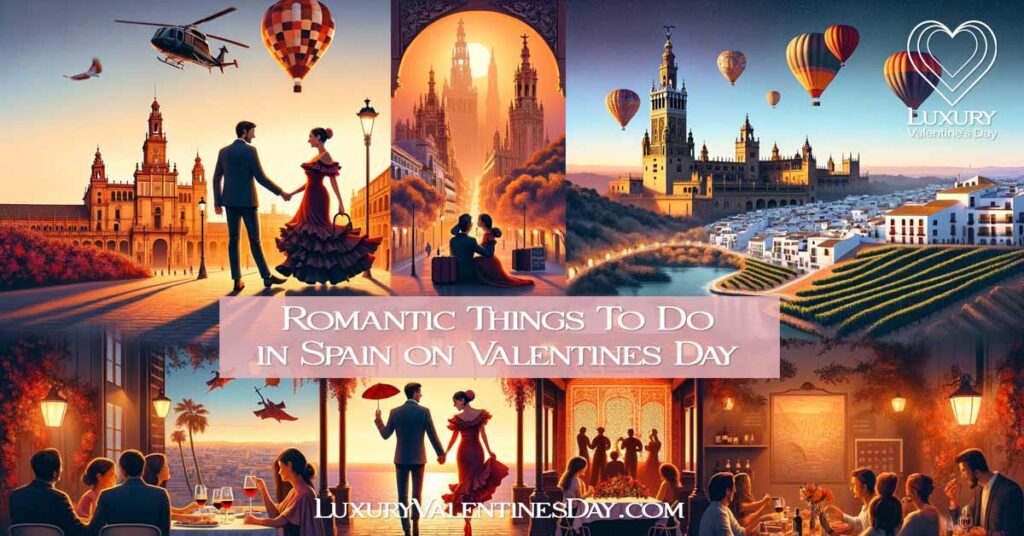
With its enchanting landscapes, vibrant cities, and rich cultural heritage, Spain offers a plethora of romantic activities and things to do that couples can indulge in on Valentine’s Day.
1. Strolling Through Historic Streets
Cities like Seville, Granada, and Barcelona boast charming old towns with narrow, winding streets that are perfect for leisurely strolls. Couples can explore these historic quarters, perhaps stopping for a coffee in a quaint café or simply soaking in the ambiance.
2. Beach Getaways
Spain’s extensive coastline offers numerous idyllic beaches. Couples can enjoy a serene sunset walk along the shores of Costa Brava or share a quiet moment on the pristine beaches of the Balearic Islands.
3. Flamenco Shows
Experiencing a live flamenco show is a passionate and unforgettable experience. The intensity and emotion of the dance can make for a memorable and romantic evening.
4. Wine Tasting
Spain is renowned for its wines. Couples can visit vineyards in regions like La Rioja or Ribera del Duero for wine-tasting sessions, exploring the rich flavors and enjoying the scenic vineyards.
5. Hot Air Balloon Rides
For a truly magical experience, couples can take a hot air balloon ride over regions like Catalonia or Segovia, witnessing breathtaking views and creating unforgettable memories.
6. Gastronomic Experiences
Spanish cuisine is diverse and delectable. Couples can explore local markets, indulge in a tapas crawl, or even take a cooking class together to delve into the flavours of Spain.
7. Art and Culture
Visiting art museums like the Prado in Madrid or the Guggenheim in Bilbao can be a delightful experience for art-loving couples.
8. Sailing and Cruises
Couples can opt for a romantic sailing experience along the Mediterranean coast or take a cruise to explore Spain’s beautiful islands.
9. Spa Retreats
Luxurious spa retreats in regions like Andalusia offer couples a chance to unwind and enjoy rejuvenating treatments in a serene setting.
10. Scenic Train Journeys
Spain offers some picturesque train routes, such as the Al-Andalus or El Transcantábrico, where couples can enjoy luxurious cabins and stunning views.
11. Festivals and Events
Depending on the time of year, couples can partake in local festivals and events, immersing themselves in the vibrant culture and festivities.
12. Stargazing in the Canary Islands
The Canary Islands are known for their clear skies and are perfect for a romantic night of stargazing.
Each of these activities offers a unique way to celebrate love and create lasting memories. Whether it’s the allure of historic cities, the tranquility of the beaches, or the vibrancy of cultural experiences, Spain provides a romantic backdrop that caters to diverse preferences and ensures an unforgettable “El Día de San Valentín.”
Top 5 Luxurious Destinations in Spain for “El Día de San Valentín”

- Ibiza:
- Why: Known for its vibrant nightlife and stunning beaches, Ibiza offers luxurious resorts perfect for a romantic getaway.
- Highlight: Private beach dinners and exclusive yacht charters.
- Barcelona:
- Why: A city that combines art, gastronomy, and beautiful architecture.
- Highlight: Romantic walks down the Passeig de Gràcia and private tours of Gaudí’s masterpieces.
- Seville:
- Why: The charm of Andalusia is encapsulated in this city’s historic streets and flamenco shows.
- Highlight: Luxurious stays in historic palaces and intimate river cruises on the Guadalquivir.
- Marbella:
- Why: Known for its upscale resorts and beautiful coastline.
- Highlight: Exclusive beach clubs and golf resorts.
- Madrid:
- Why: The capital offers luxurious hotels, gourmet dining, and a rich cultural scene.
- Highlight: Private tours of the Prado Museum and rooftop dining experiences.
Each of these destinations offers a unique and luxurious experience, ensuring that your day of love is celebrated in style. From secluded beach resorts to vibrant cities filled with culture and history, couples are sure to find the perfect backdrop for a memorable celebration in Spain.
Cultural Significance
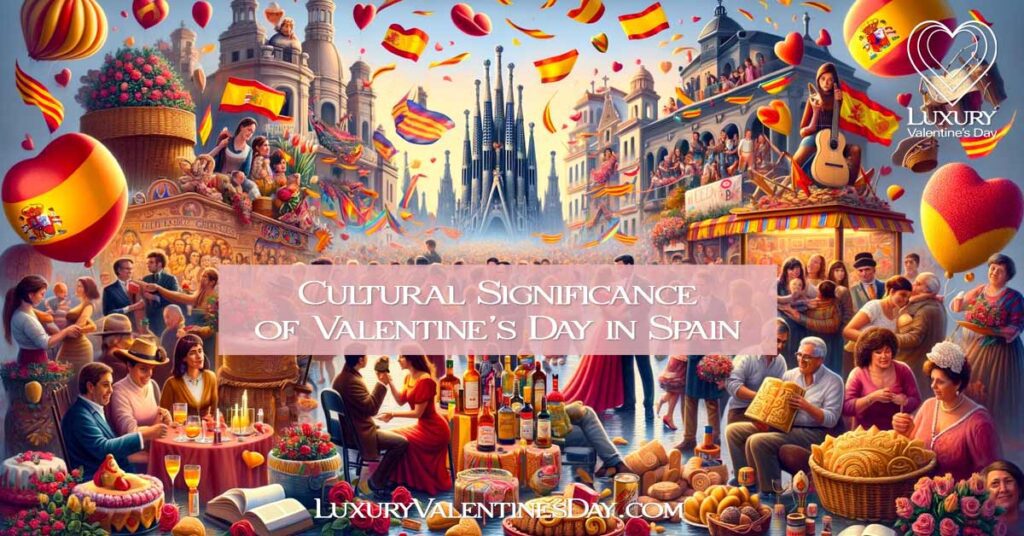
The cultural significance of Valentine’s Day in Spain is deeply intertwined with the country’s rich history, traditions, and social values. While it is a relatively modern celebration in Spain, having gained prominence in the latter half of the 20th century, it has quickly become a cherished occasion.
Integration with Local Traditions: Valentine’s Day in Spain is not just a commercial holiday but has been seamlessly integrated into the local culture. Regions like Catalonia and Valencia have blended the celebration with their own traditional festivals, such as Sant Jordi and San Dionisio, respectively. These festivals have deep historical roots and are celebrated with fervour.
Expression of Love and Affection: The day holds cultural significance as an opportunity for individuals to express their love and affection, not just towards romantic partners, but also towards friends and family. This aligns with the Spanish values of close familial bonds and friendships.
Celebration of Diversity: Spain’s progressive and inclusive society ensures that Valentine’s Day is celebrated by everyone, regardless of their sexual orientation. The day has become a symbol of love in all its forms, reflecting the country’s open and accepting culture.
Emphasis on Experience and Celebration: The Spanish culture places a strong emphasis on celebrating life and creating memorable experiences. “El Día de San Valentín” is seen as an opportunity to indulge in the joys of life, be it through food, music, dance, or shared experiences.
Influence of Religion: While Valentine’s Day is not a religious holiday, the story of Saint Valentine and the themes of love and sacrifice resonate with the predominantly Catholic population. The day is often seen as a celebration of love in a broader sense, aligning with the teachings of compassion and love.
Adaptation and Evolution: The cultural significance of Valentine’s Day in Spain has evolved over time. While it started as a celebration predominantly focused on romantic love, it has grown to encompass various forms of love and affection, adapting to societal changes and attitudes.
In essence, “El Día de San Valentín” in Spain is a reflection of the country’s rich cultural tapestry, embodying traditions, modern values, and an enduring celebration of love and connection.
Events and Celebrations Ideas

“El Día de San Valentín” in Spain is a lively affair, marked by an array of events and celebrations that cater to diverse preferences, ensuring that everyone has a chance to revel in the spirit of love.
Romantic Concerts and Performances: Cities across Spain come alive with the sound of music and dance. Concert halls, theaters, and intimate venues host performances ranging from classical music concerts to passionate flamenco shows. These performances create a romantic ambiance, allowing couples to immerse themselves in the cultural richness of Spain.
Exclusive Parties and Galas: Luxurious hotels, resorts, and exclusive clubs often organize grand Valentine’s Day parties and galas. These events are characterized by elegant settings, live music, gourmet dining, and dancing. Couples can don elegant attire and enjoy a night of sophistication and celebration.
Themed Dinners: Restaurants across the country curate special menus for Valentine’s Day, offering themed dining experiences that showcase the culinary diversity of Spain. From candlelit dinners in cozy bistros to elaborate tasting menus in Michelin-starred restaurants, couples can indulge in a gastronomic journey.
Cultural Events: Museums, art galleries, and cultural centers often host special exhibitions or events centered around themes of love and romance. These cultural outings provide an opportunity for couples to explore art and history while celebrating their connection.
Outdoor Celebrations: Public spaces, such as parks, squares, and promenades, may host open-air concerts, dance performances, or movie nights featuring classic romantic films. These events provide a relaxed and communal atmosphere for celebrating love.
Workshops and Classes: Couples looking for a shared experience can participate in workshops and classes tailored for Valentine’s Day. These may include couples’ cooking classes, art workshops, or dance lessons, allowing pairs to bond and create memories together.
Spa and Wellness Packages: Luxury spas and wellness centers often curate special packages for couples, offering treatments such as massages, facials, and wellness experiences. These packages provide a serene and rejuvenating escape for couples seeking relaxation.
Adventure Activities: For those seeking a dose of adrenaline, adventure activities such as hot air balloon rides, sailing excursions, or wine-tasting tours in picturesque vineyards are popular options.
Community and Social Events: Community centers and social clubs may organize events that celebrate love in all its forms, ensuring that everyone, regardless of their relationship status, can partake in the festivities.
Local Festivals and Traditions: In addition to Valentine’s Day, local festivals such as Sant Jordi in Catalonia and San Dionisio in Valencia add a unique flavor to the celebrations of love.
These diverse events and celebrations ensure that “El Día de San Valentín” in Spain is a vibrant and inclusive affair, offering something for everyone and creating an atmosphere of joy and affection.
Must-Attend Events in Spain
| Event | Location | Date | Description |
|---|---|---|---|
| Valentine’s Flamenco Show | Seville | February 14th | Experience the passion of flamenco in an intimate setting. The show features traditional dances and music, capturing the essence of love and celebration. |
| Sant Jordi Festival | Barcelona | April 23rd | A unique celebration where couples exchange books and roses. The streets are adorned with stalls, creating a vibrant and romantic atmosphere. |
| San Dionisio Festival | Valencia | October 9th | Known as the “Valencian Valentine’s Day,” couples exchange marzipan sweets and handkerchiefs, celebrating love with a local touch. |
| Valentine’s Gala Dinner | Madrid | February 14th | A luxurious gala dinner hosted by a high-end hotel, featuring gourmet cuisine, live music, and dancing in an elegant setting. |
| Hot Air Balloon Ride | Catalonia | February 14th | Couples can enjoy breathtaking views of the Catalan countryside on a romantic hot air balloon ride, complete with a champagne toast. |
| Couples’ Cooking Class | Bilbao | February 14th | A hands-on cooking class where couples can learn to prepare traditional Basque dishes together, creating a memorable and interactive experience. |
| Romantic Movie Night Under the Stars | Malaga | February 14th | An open-air cinema experience where classic romantic films are screened, allowing couples to enjoy a movie under the night sky. |
| Valentine’s Day Concert | Granada | February 14th | A special concert featuring romantic melodies and classical tunes, providing a cultural and intimate experience for couples. |
| Exclusive Beach Party | Ibiza | February 14th | A lively beach party at an exclusive club, featuring renowned DJs, cocktails, and a vibrant atmosphere right by the sea. |
| Wine and Dine Experience | La Rioja | February 14th | Couples can explore vineyards, indulge in wine-tasting sessions, and enjoy a romantic dinner amidst the scenic beauty of Spain’s wine country. |
These events, spread across various regions of Spain, offer a diverse range of experiences, ensuring that there is something for every couple looking to celebrate the day lof love in a memorable and unique way.
Modern Trends and Changes in Spain
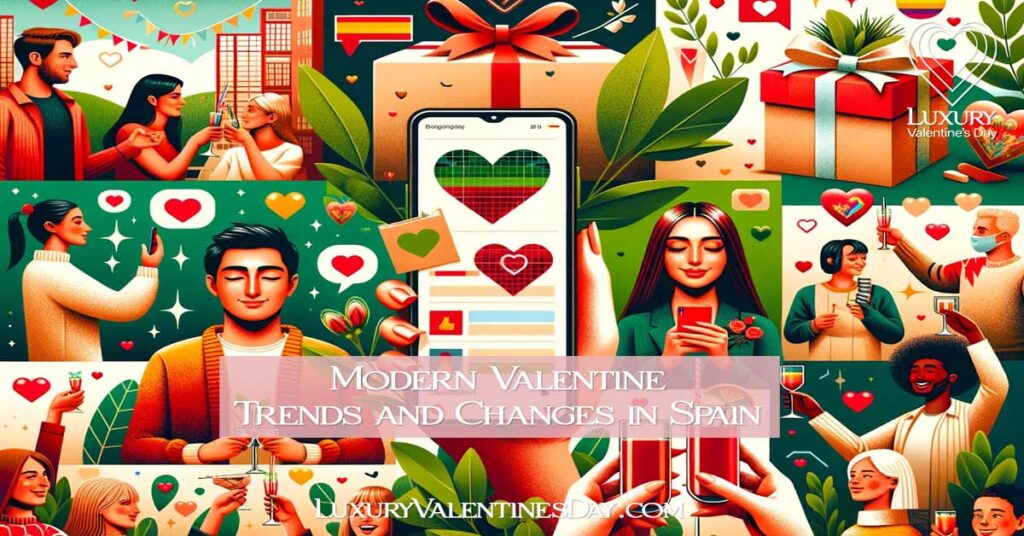
In recent years, the celebration of “El Día de San Valentín” and Valentine’s Day in Spain has seen a shift, reflecting modern sensibilities and societal changes. These trends have added new dimensions to the traditional ways of celebrating love.
Digital Expressions of Love: With the advent of technology and social media, expressions of love have taken a digital turn. Couples, especially among the younger generation, often use social media platforms to share heartfelt messages, photos, and virtual gifts. Online platforms also facilitate long-distance celebrations, allowing couples to connect virtually.
Experiential Gifts: There is a growing preference for experiential gifts over material possessions. Couples are increasingly opting for experiences such as weekend getaways, adventure activities, or attending concerts and events together. These experiences are seen as more meaningful and create lasting memories.
Personalized and Thoughtful Gifting: The trend of personalized gifts has gained popularity. Custom-made jewelry, personalized artwork, and bespoke experiences tailored to a partner’s preferences are seen as thoughtful and cherished gestures.
Inclusivity and Diversity: Valentine’s Day celebrations in Spain have become more inclusive, embracing diverse expressions of love. The LGBTQ+ community actively participates in the celebrations, and events cater to different orientations and preferences, reflecting Spain’s progressive and accepting society.
Sustainable and Eco-Friendly Celebrations: There is a growing awareness and preference for sustainable and eco-friendly choices in celebrations. Couples are opting for environmentally conscious gifts, such as sustainably sourced chocolates, organic wines, and eco-friendly products.
Health and Wellness Focus: Wellness experiences, such as spa retreats, yoga sessions, and health-focused getaways, have gained popularity as Valentine’s Day gifts. Couples are increasingly valuing experiences that contribute to their well-being and relaxation.
Celebrating Friendship and Self-Love: Valentine’s Day in Spain is no longer confined to romantic love alone. People celebrate friendships and practice self-love, taking the opportunity to indulge in activities they enjoy and spending time with friends and family.
Local and Traditional Embrace: While modern trends are influencing celebrations, there is also a resurgence in embracing local traditions and customs. Couples are exploring traditional festivals and incorporating local customs into their celebrations.
Culinary Innovations: Spanish cuisine, known for its rich flavors, has seen innovations with special Valentine’s Day menus that blend traditional tastes with modern culinary techniques.
Online Shopping and E-Gifting: The convenience of online shopping has led to a surge in e-gifting, where couples send gifts and vouchers to each other through online platforms.
These modern trends and changes showcase how “El Día de San Valentín” in Spain is evolving, blending tradition with contemporary practices, and ensuring that the celebration of love remains vibrant and relevant in today’s dynamic society.
Tips for Celebrating Valentine’s Day in Spain in Style
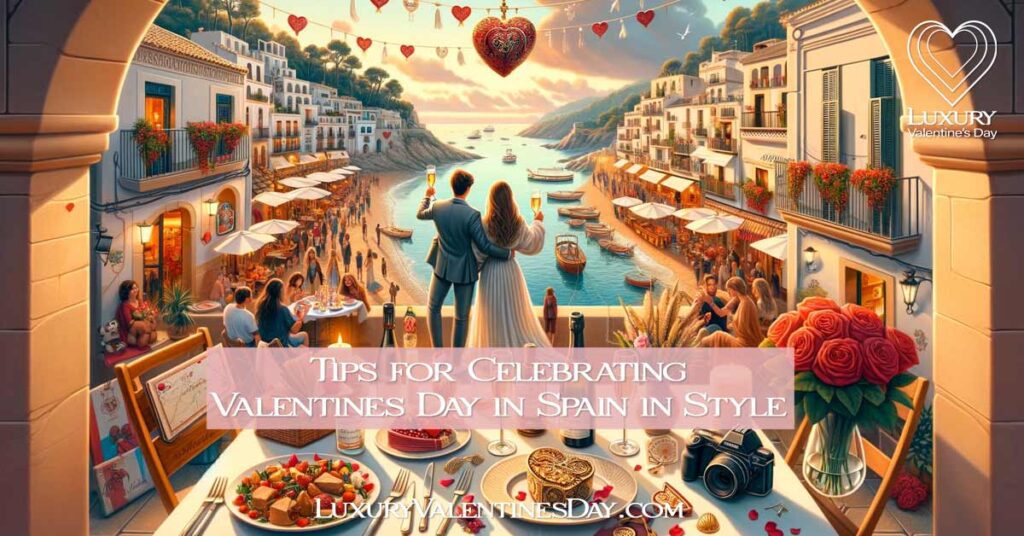
Celebrating Spainish Valentine’s Day or “El Día de San Valentín” can be a truly memorable experience. Here are some tips to ensure that your celebration is stylish, unique, and unforgettable:
1. Plan a Surprise Getaway:
- Tip: Choose a destination that holds sentimental value or offers a new experience. Whether it’s a cozy bed and breakfast in the countryside or a luxury resort on the coast, a surprise getaway can be incredibly romantic.
2. Curate a Culinary Experience:
- Tip: Reserve a table at a renowned restaurant or organize a private dining experience. Consider places that offer traditional Spanish cuisine with a modern twist, or perhaps a location with a stunning view.
3. Embrace Local Traditions:
- Tip: Incorporate local customs and traditions into your celebration. Participate in regional festivals like Sant Jordi or explore traditional gift-giving customs.
4. Personalize Your Gifts:
- Tip: Opt for gifts that have a personal touch, such as custom-made jewelry, personalized artwork, or a bespoke experience tailored to your partner’s interests.
5. Explore Cultural and Artistic Venues:
- Tip: Plan a visit to a museum, art gallery, or a flamenco show. Engaging in cultural activities adds depth and uniqueness to your celebration.
6. Opt for Sustainable Choices:
- Tip: Choose eco-friendly and sustainable gifts, such as locally sourced products, organic wines, or experiences that promote environmental conservation.
7. Capture the Moment:
- Tip: Consider hiring a professional photographer for a romantic photoshoot or simply capture candid moments yourself. Documenting your celebration ensures lasting memories.
8. Create a Relaxing Ambiance:
- Tip: Transform your space with candles, soft music, and aromatic flowers. Creating a serene and intimate atmosphere can make your celebration more special.
9. Celebrate with Friends and Family:
- Tip: Valentine’s Day is not just for couples. Organize a gathering or a party to celebrate love in all its forms, including friendships and family bonds.
10. Prioritize Experiences Over Material Gifts:
– Tip: Focus on creating memorable experiences, whether it’s a hot air balloon ride, a cooking class, or a scenic hike. Experiences often hold more sentimental value.
11. Dress to Impress:
– Tip: Choose an outfit that makes you feel confident and complements the occasion. Whether it’s a formal attire for a gala or casual wear for a beach date, dressing appropriately adds to the experience.
12. Respect and Inclusivity:
– Tip: Ensure that your celebrations are respectful and inclusive, embracing diverse expressions of love and different orientations.
13. Plan Ahead:
– Tip: Make reservations and plan your gifts in advance to avoid last-minute rushes and ensure a smooth and enjoyable celebration.
14. Stay True to Your Preferences:
– Tip: While it’s great to embrace traditions and trends, ensure that your celebration reflects your preferences and values.
By incorporating these tips, you can ensure that your celebration of “El Día de San Valentín” in Spain is not only stylish and memorable but also deeply personal and meaningful.
Do’s and Don’ts on the Big Day

Celebrating Val Day in Spain can be a delightful experience when done right. Here’s a list of do’s and don’ts to ensure your celebration is smooth and memorable:
Do’s
1. Do Plan Ahead:
- Ensure that you make reservations, book tickets, and plan your gifts well in advance to avoid last-minute hassles.
2. Do Embrace Local Customs:
- Participate in and respect local traditions and customs related to Valentine’s Day, such as attending local festivals or understanding gift-giving nuances.
3. Do Opt for Personalization:
- Personalized gifts and experiences often hold more sentimental value. Tailor your gifts and plans to suit your partner’s preferences.
4. Do Be Inclusive:
- Remember that Valentine’s Day is a celebration of all forms of love, including friendships and self-love. Be inclusive in your celebrations.
5. Do Choose Quality Over Quantity:
- Focus on the quality of your gifts and experiences rather than the quantity. A thoughtful gesture often means more.
6. Do Respect Privacy:
- While sharing on social media can be fun, respect your partner’s privacy and ensure that any shared content is mutually agreed upon.
7. Do Be Mindful of Sustainability:
- Opt for eco-friendly gifts and experiences that promote sustainability.
8. Do Dress Appropriately:
- Pay attention to the dress code of events and choose an outfit that suits the occasion.
9. Do Be Open to New Experiences:
- Be open to trying out new experiences, whether it’s a new type of cuisine or a different kind of celebration.
10. Do Communicate Clearly:
- Clear communication about plans and expectations can prevent misunderstandings and enhance the celebration.
Don’ts
1. Don’t Procrastinate:
- Avoid leaving your plans and reservations to the last minute.
2. Don’t Overlook Cultural Sensitivities:
- Be mindful of local customs and traditions and ensure your celebrations are respectful.
3. Don’t Overshare on Social Media:
- Be mindful of your partner’s comfort level with public displays of affection on social media.
4. Don’t Neglect Personal Preferences:
- Pay attention to your partner’s likes and dislikes when planning your celebration.
5. Don’t Stress Over Perfection:
- While it’s great to plan, remember that small imperfections can sometimes lead to cherished memories.
6. Don’t Ignore Budget Constraints:
- Plan a celebration that is within your means and focuses on the sentiment rather than extravagance.
7. Don’t Forget to Be Present:
- Enjoy the moment and be present, rather than being preoccupied with capturing the perfect photo or social media update.
8. Don’t Neglect Self-Love:
- Remember that Valentine’s Day is also an opportunity to practice self-love and self-care.
9. Don’t Disregard Dietary Preferences:
- If planning a meal, be mindful of your partner’s dietary preferences and restrictions.
10. Don’t Overlook Small Gestures:
- Sometimes, small gestures of love and affection can be just as meaningful as grand celebrations.
By keeping these do’s and don’ts in mind, you can ensure that your celebration is thoughtful, respectful, and truly memorable.
Spainish Valentine’s Dates
Here’s a table detailing when Valentine’s Day, or “El Día de San Valentín,” falls for the years 2024 to 2030. This information can be helpful for planning your celebrations in advance.
| Year | Date | Day |
|---|---|---|
| 2024 | February 14th | Wednesday |
| 2025 | February 14th | Friday |
| 2026 | February 14th | Saturday |
| 2027 | February 14th | Sunday |
| 2028 | February 14th | Monday |
| 2029 | February 14th | Wednesday |
| 2030 | February 14th | Thursday |
This table provides a quick reference for the dates and days of the week when Valentine’s Day is celebrated, allowing individuals and couples to plan their celebrations with ease and convenience.
My Final Thoughts About Spanish Valentine’s Day
“El Día de San Valentín” or Valentine’s Day in Spain is a rich tapestry that seamlessly weaves together tradition, modernity, and diverse expressions of love. From the charming streets of Barcelona during Sant Jordi to the lively festivals of San Dionisio in Valencia, Spain offers a unique and vibrant backdrop for celebrating love.
Spain’s approach to Valentine’s Day is a testament to its cultural richness and openness to evolving trends. Whether it’s the traditional exchange of roses and books, the modern embrace of digital expressions of affection, or the inclusive celebrations that honor all forms of love, Spain offers a multifaceted and memorable experience.
The variety of celebrations, from intimate dinners in historic cities to lively parties on sun-kissed beaches, ensures that there is something for everyone. The country’s commitment to inclusivity, sustainability, and personalization in its celebrations adds depth and meaning to the festivities.
As we reflect on the universality of love and the diverse ways it is celebrated around the world, Spain stands out as a destination that honors the past while enthusiastically embracing the future. “El Día de San Valentín” in Spain is not just a day but a series of moments and experiences that collectively celebrate love in all its splendid forms.
So, whether you’re planning a romantic getaway, seeking to understand local customs, or simply wanting to immerse yourself in the spirit of love, Spain offers a rich and enchanting canvas. Here, every celebration is a unique masterpiece, painted with the vibrant colors of affection, tradition, and modernity.
FAQs: Navigating Love and Celebrations in Spain
When is Valentine’s Day in Spain?
Valentine’s Day, known as “El Día de San Valentín,” is celebrated in Spain on February 14th, similar to many other countries around the world.
How is “El Día de San Valentín” celebrated in Spain?
“El Día de San Valentín” in Spain is celebrated with a mix of traditional and modern customs. Couples often exchange gifts such as chocolates, flowers, and personalized items. Romantic dinners, outings, and cultural events are also popular. Additionally, regions like Catalonia and Valencia have their own unique celebrations, such as Sant Jordi and San Dionisio.
Are there any unique gift-giving traditions for Valentine’s Day in Spain?
While traditional gifts like chocolates and flowers are common, Spain also has unique gift-giving traditions. For instance, in Catalonia, couples exchange roses and books during Sant Jordi. In Valencia, the San Dionisio celebration involves exchanging marzipan sweets and handkerchiefs.
What are some luxurious destinations to celebrate Valentine’s Day in Spain?
Spain offers a plethora of luxurious destinations for Valentine’s Day celebrations. From the romantic ambiance of Seville and the vibrant nightlife of Ibiza to the cultural richness of Barcelona and the serene beaches of Costa Brava, there are numerous options for high-end experiences.
Are there any specific events or festivals related to love and romance in Spain?
Yes, apart from “El Día de San Valentín,” Spain celebrates love through various regional festivals. Sant Jordi in Barcelona on April 23rd and San Dionisio in Valencia on October 9th are notable examples. These festivals have their own customs, such as exchanging books and roses or marzipan sweets.
Is Valentine’s Day a public holiday in Spain?
No, Valentine’s Day is not a public holiday in Spain. However, it is widely celebrated, and many restaurants, shops, and venues may have special offerings or events to mark the occasion.
These FAQs provide a comprehensive understanding of the diverse and vibrant ways in which love is celebrated in Spain, offering insights for both locals and visitors looking to partake in “El Día de San Valentín” and related traditions.
Valentine’s Day in Europe
- France Valentine’s Day
- Valentine’s Day in Germany : A Journey of Love and Tradition
- Valentine’s Day in England
- Valentine’s Day Italy
- Valentine’s Day in Poland: Unveiling the Heart of Romance in Eastern Europe
- Valentines Wales
- Valentine’s Day Norway
Latest Articles
- Date Night Quotes: Perfect Captions for Every Romantic Moment

- Future Trends: The Evolution of Valentine’s Day in Austria

- Criticism and Controversy: Examining Valentine’s Day in Austria

- Austrian Celebrity Culture and Valentine’s Day

- Commercial Aspects of Valentine’s Day in Austria

- 101 Hilarious Dating Quotes to Brighten Your Day








